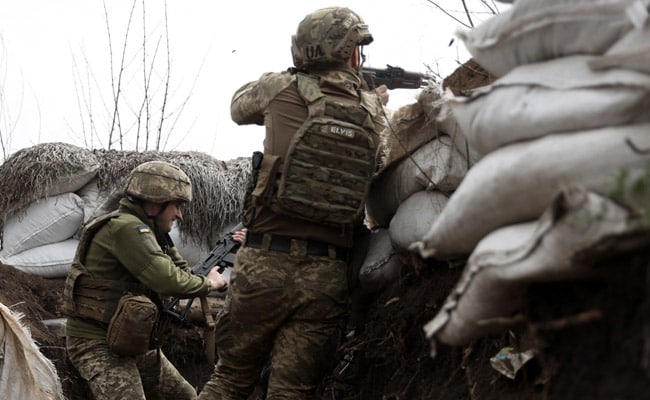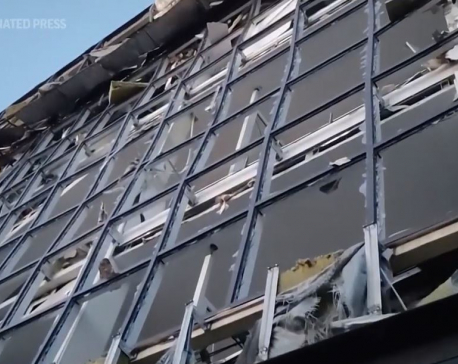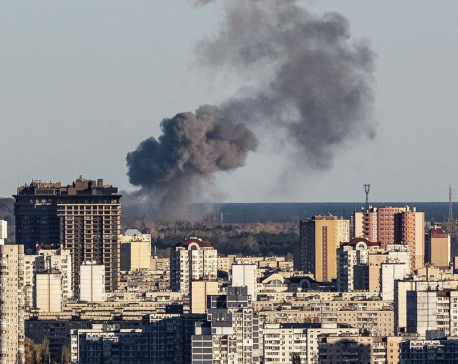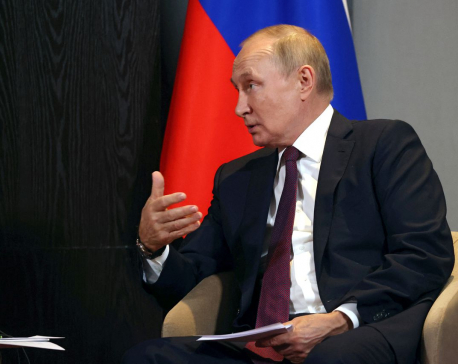
OR
Opinion
Russia-Ukraine War: Failure of Global Diplomacy
Published On: April 30, 2022 10:15 AM NPT By: Shambhu Ram Simkhada

The Russian invasion of Ukraine is being compared to the Italian invasion of Ethiopia. Indeed, if Cambodia, Rwanda, Yugoslavia, Afghanistan, Iraq, Yemen and now Ukraine are to keep repeating, where then is the value of the UN?
“War begins when diplomacy fails.” This idea places diplomacy in the frontline of national defense, international peace and security. The failure of diplomacy has led to devastating and among countries and even world wars. So, if prevention is the first goal of diplomacy, the ongoing war in Ukraine is a failure of diplomacy at many levels, Ukrainian, Russian, European, and global (UN).
Valor after failure
The valiant way TV actor turned President of Ukraine has rallied his army and people in resisting the Russian invasion is truly amazing. Amidst the death and destruction, tightening sanctions against Russia and pouring in of Western military, humanitarian and financial support has helped Ukraine not just withstand the Russian onslaught but also inflict heavy losses stalling Russian blitzkrieg and forcing a protracted war.
Despite the bravery of the fighters and resilience of the people, the unbelievable destruction of the country and heartbreaking displacements, sufferings, and deaths of the people show the brunt born by Ukraine. As war could not be prevented, if resolution is the next vital goal of diplomacy, rather than grandstanding with the backing of remote actors, shouldn’t resolving the dispute with its more powerful immediate neighbor through diplomacy and save more Ukrainian people from dying and the country being further devastated be the priority of Zelensky’s government?
Serious miscalculation
Unable to achieve its national goals through diplomacy, Russia resorted to a naked invasion of its smaller neighbor with close historic, geographic, economic, security and civilizational bonds. Contrary to his goals, President Putin’s action has bolstered NATO in Russia’s immediate neighborhood and is making Ukrainians more anti-Russian.
The more the war prolongs, the bigger the costs will be and the morale and material support will decline. With the majority of the world opposed, Russia’s European friends shocked and rivals supplying so much money and materials, how will Russia achieve its goals without more violence and destruction? With a much larger military might, Russia may be able to subjugate Ukraine militarily but how will it sustain what it imposes? So, for Russia, too, resolving the crisis through direct diplomacy with Ukraine or good offices of friends would be the best way out.
Political economy and security in peril
Scholars of International Relations had started looking at modern Europe with great admiration for presenting a new model of internal governance and inter-state relations. It had succeeded in not only reconciling with its troubled history, rebuilding the economies and societies but also moving toward transforming internal politics and external relations from the traditional state and power centricity to a more just norms and rules-based order, consistent with the dynamics of time and technology.
The European Union is a revolutionary idea of transforming “sovereignty” by evolving the territorial nation-state vertically upward to a multinational institutional arrangement and downward to making the individual sovereign and horizontally sharing power with the European courts, parliament, labor unions, other institutions of civil society etc. This made Europe different from the assembly of traditional nation-states. The EU was emerging as a global power in many ways, competing with the United States, Russia, China, and India which are still based on the early European idea of monopoly over violence.
A transformative thesis often encounters a strong anti-thesis, resurgent populism, ultranationalism, anti-migrant movements and Brexit in this case. Expansion to Eastern Europe without either sufficient socio-political-legal compatibility or enough strategic caution on how the traditional European rival Russia would react were unknowns about which many had cautioned including this author. President Putin, product of the Cold War, feeling vilified, cornered, fighting a losing battle, used not just EU but NATO expansion to areas the Russians have historically drawn a red line, invoking old Russian Greatness, fear, rivalry, painful memory of World War II or trauma of the Soviet Union’s collapse to justify his action and obviously remain in power.
One did not need to be a genius to see that the European Project faced two fundamental dilemmas, shrinking indigenous population but politicization of migrants primarily from its Eurasian vicinity in flux filling the essential workforce and after post-war economic and social recovery, Europe's rise as a powerful global actor but under the US security umbrella. Neither did the political leadership visualize the complexities of these contradictions, except perhaps France a little bit, nor did the Commission leadership help to reconcile them before starting to throw its political, economic, and diplomatic weight around.
After Trump’s coaxing and Biden’s diplomacy of strengthening NATO for a longer-term strategic goal, Putin with one bang has hit at the heart of the EU philosophy once again, militarizing Europe which has started to regard war not only improbable but unthinkable. This war has exposed Europe’s energy and security vulnerability. But the costs of the war could escalate, exposing not just Europe but the global political economy and security.
UN’s death knell?
To solve disputes between countries before they erupted into open warfare, the League of Nations was established after World War I. Its failure to prevent the Italian invasion of Ethiopia in 1935 is sometimes seen as not just the casus belli of World War II but also the death knell on the inter-war body politic and consequently the League.
In the aftermath of the tragedies of WWII, the League was replaced by the UN “to save succeeding generations from the scourge of wars, which twice in our lifetime has brought untold sorrow to mankind…”. The Russian invasion of Ukraine is being compared to the Italian invasion of Ethiopia. Indeed, if Cambodia, Rwanda, Yugoslavia, Afghanistan, Iraq, Yemen and now Ukraine are to keep repeating, where then is the value of the UN? Ukraine war shows most strikingly UN’s total marginalization under the careerist leadership nurtured by the major powers, the P5 and even among them the sole global superpower and its allies. This means the world needs the UN more than ever, but fundamentally reformed and restructured.
Conclusion
The toll of the Russia-Ukraine war is reverberating across the world with food and fuel shortages, rising prices, sanctions, and counter sanctions disrupting the global economy and society. Voting in the UN shows the world looks at the tragic situation in Ukraine from different angles. More than anything, if the role of diplomatic scholarship and leadership is prevention first and resolution, when necessary, then this war is a result of failures at all levels, Ukrainian, Russian, European, and global.
The longer the war prolongs, the greater are the risks of it crossing the geographic and technological threshold, further adding to the tragedies of the peoples. But for those unaffected by the peoples’ sufferings, motivated only by power and profit, what would be a bigger prize than a third world war? That is what makes the current diplomatic lethargy worrying but not astonishing. With NATO and Russia determined not to blink, the roles of rising China, India, Turkey, Israel, and Europe “on the side of peace” could be crucial in resolving the crisis before thresholds are surpassed and the Russia-Ukraine war (at least directly so far) also begins to engulf others.
You May Like This

Russian missile kills 11 in a pizza parlor and Ukraine arrests man accused of directing the strike
KYIV, Ukraine: Ukrainian authorities on Wednesday arrested a man they accused of helping Russia direct a missile strike that killed... Read More...

Grain ships sail despite Moscow's pullout from deal; missiles rain on Ukraine
KYIV, Oct 31: Twelve ships carrying grain left Ukrainian ports on Monday despite Russia having abandoned a U.N.-backed deal to guarantee... Read More...

With a grin, Putin warns Ukraine: the war can get more serious
SAMARKAND, Uzbekistan, Sept 17: President Vladimir Putin on Friday brushed off a lightning Ukrainian counter-offensive with a smile but warned... Read More...







Just In
- NRB to provide collateral-free loans to foreign employment seekers
- NEB to publish Grade 12 results next week
- Body handover begins; Relatives remain dissatisfied with insurance, compensation amount
- NC defers its plan to join Koshi govt
- NRB to review microfinance loan interest rate
- 134 dead in floods and landslides since onset of monsoon this year
- Mahakali Irrigation Project sees only 22 percent physical progress in 18 years
- Singapore now holds world's most powerful passport; Nepal stays at 98th












Leave A Comment